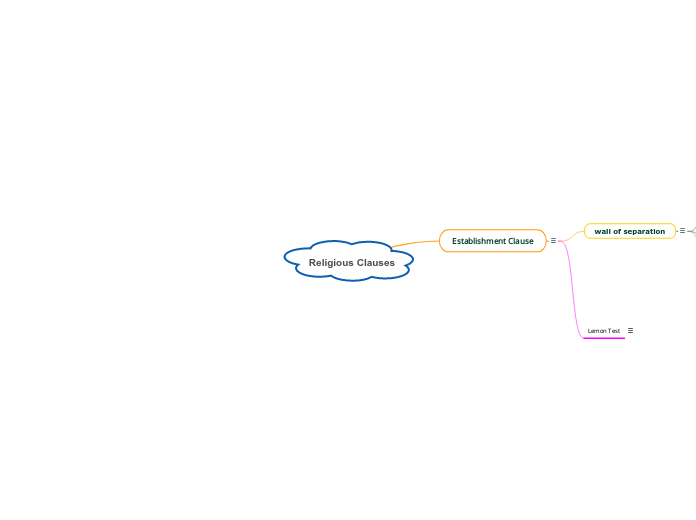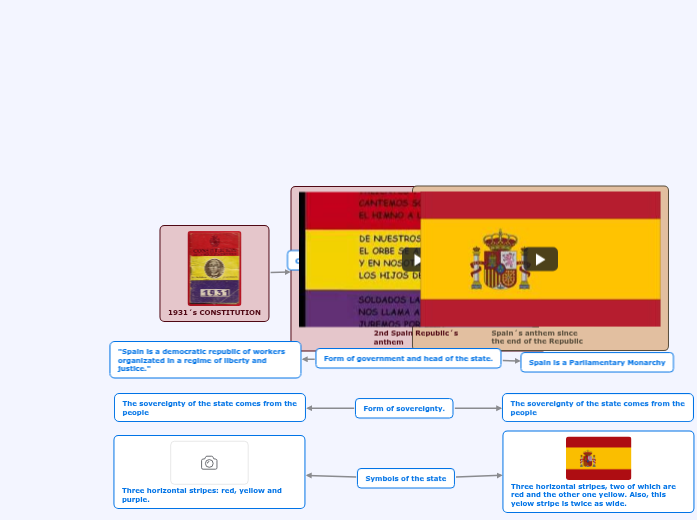Religious Clauses
Establishment Clause
The establishment clause is a clause in the US constitution that prohibits the government from becoming involved with religion. It protects the people of the US and makes sure that everyone can chose to be whatever religion they want. With this the governemnt can not establish one specific religion or do any action in favor of any specific reigion.
Lemon Test
The lemon test is a test that the US federal courts use to determine if the government has done something that violates the establishment clause of the first amendment. This test has been used for tons of court cases to prove that the government had violated the constitution and it will continue to do so in the future.
A state law will be found to be constitutional if:
- It has a secular purpose
- It neither advances or inhibits religion
- It does not foster excessive government entanglement with religion
wall of separation
The wall of seperation refers to the seperation between church and state and the wall is the line between them. If the government crosses that line/breaks the wall, their action will be considered unconstitutional. This term is used in many court cases to see if they violated the establishment clause.
Religious Symbols In Public Spaces
This topic is another one that is constanty in question of breaching the wall between church and state. It involves putting religious displays on public property. People can do this, but they must be careful not to violate the establishment clause by breaching the wall. The main question that people try to answer regarding this is what makes something a religious symbol?
County of Allegheny V ACLU
This case involves 2 religious holiday public displays in pittsburgh, PA. The first contained a chirstian nativity scene displayed in the Allegheny County Courthouse. The second was a large menorah displayed outside the city county building. The ACLU claimed that these displays breached the wall of seperation. The court concluded that the chanukah display didn't violate the first amendment. However, the creche inside the building did breach the wall and violate the establishment clause because it contained the words " glory to god for birth of Jesus Christ," which promoted christianity. (not a secular purpose)
Lynch V Donnelly
Every year Pawtucket, Rhode island puts up a christmas display in the city's shopping district, which included many different things representing the holiday. The display included a nativity scene. This was brought to the courts to discuss whether or not this public religious symbol (the creche) breached the wall of seperation. The court concluded that it did not breach the wall or violate the establishment clause because the dispaly only represented the history of the holiday and did not advocate for any specific religion.
Tax Money for Religious Education
This concept is where the governemt uses tax money to help religious education in any way. Many people bring cases to the court regarding this topic as they feel the government breached the wall of seperation and violated the establishment clause.
McCollum V Board of Education
The case involved public schools setting aside time in class for religious instruction. Although the classes were not mandatory, Mcollum, an atheist and the mother of a student, complained that her son was being ostracised for not going to these religious classes. She sued the school board arguing that they violated the establishment clause. the court concluded that the use of tax supported property for religious classes did breach the wall of seperation between church and state.
Everson V Board of Education
New Jersey passed a law authorizing that the school board cover the costs of transportation to and from school. Majority of the private schools that benefited from this law were parochial catholic schools. Everson, a taxpayer in Ewing township, claimed the money that he is paying was directly funding the religious school bussing since the government was reimbursing the parents. The court concluded that the reimbursement for transportation did not violate the wall of seperation or the establishment clause as this law was created to help all parents in all religions.
Prayer in Public Schools
Many cases have been brought up questioning if prayer in public schools breaches the wall of seperation and violates the estabishment clause. Public schools are funded by the government and therefore people often get mad if they don't agree with certain reigious things happening in the school. Then they can say that the government violated the establishment clause due to the fact that it is a public school funded by the government. This becomes a whole topic for many cases brought to the court.
Santa Fe Indep. School District. V Doe
This case was a about prayers being given at public school footbal games. The court deemed this unconstituional as it gave a message that the school promoted religion, and by extension, the government, since it was a public school. Having a prayer given at an event at a public school is problematic because it breaches the wall of seperation and violates the establishment clause of the first amendment.
Lee V Weisman
This case was about a rabbi speaking at a public high school graduation. Weisman tried to put a stop to the rabbi speaking at the ceremony but when he ultimately failed, he went to the courts. The Supreme Court determined that having a religious figure speak at a public shool ceremony was unconstitutional as it violated the wall between church and state, and the face of neutrality the government is required to keep with religion.
Wallace V Jaffree
The case was that Alabama law allowed teachers in public schools to set aside a minute every morning for either meditation or prayers. Ishmael Jaffree claimed that his son was being made fun of for refusing to recite the prayers at the beginning of each day and that it was unconstitutional. The conclusion of the court was that the prayers recited in this public school breached the wall between church and state and violated the establishment clause.
Engel V Vitale
In this case the New York state board of regents allowed public schools to recite a voluntary prayer every morning.
A group of parents stood up and said that this prayer was not contrary to the religious beliefs of their children and claimed that this breached the wall between church and state as the school is government funded. The court concluded that it did, in fact, breach the wall and violate the establishment clause of religion.









